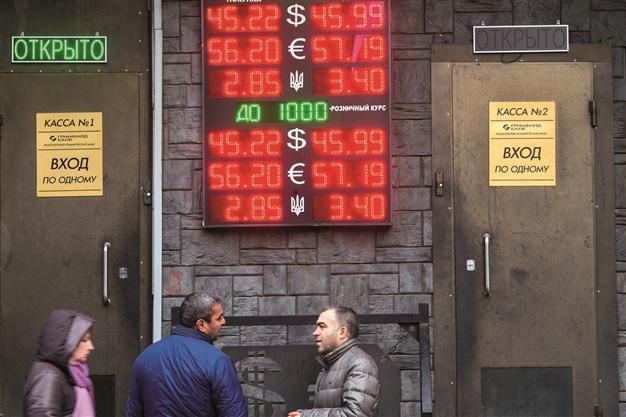Russian Central Bank expects Western sanctions to remain until end of 2017
MOSCOW-Reuters

Men talk under a board listing foreign currency rates against the Russian ruble outside an exchange office in central Moscow, on November 6, 2014. AFP Photo
The Russian central bank said Nov. 10 that it expects zero economic growth in 2015 and only 0.1 percent growth in 2016, in a three-year monetary policy strategy that anticipates Western sanctions against Russia will remain until the end of 2017.The gloomy forecasts underscore the damaging impact that two major external shocks, falling oil prices and Western financial sanctions imposed over the Ukraine crisis, are set to have on the Russian economy in the years to come.
The base scenario also forecast that capital investment would fall by 3.1 percent next year, while inflation would be 6.2-6.4 percent by year-end, above the bank’s 4.5 percent goal.
The bank said that it was also calculating its base forecasts on the Urals oil price recovering to average $95 in 2015, but falling to $90 by the end of 2017, a long-term downward trend which it said would constrain economic growth.
The three-year plan has been revised significantly since September, when the bank published a draft version that envisaged economic growth of 1 percent in 2015 and 1.8-2.0 percent in 2016, with oil prices recovering to above $100 per barrel.
In its revised plan, the bank also significantly raised its forecasts for net private sector capital outflows, to $128 billion this year and $99 billion in 2015, reflecting the damaging impact of Western sanctions on investment flows.
The bank anticipated that the current account surplus would be $60 billion in 2015, while the bank’s forex reserves would fall by $42 billion as a result of forex operations and conversion of sovereign wealth funds.
Bank floats rouble
The bank said that it intends to stick to its plan of completely floating the rouble by the end of this year, abolishing the currency’s floating corridor, but that the bank could carry out irregular forex interventions in future if financial stability is threatened.
It said that a recently launched scheme to provide forex repos to banks would be its major instrument for operations with foreign currency, anticipating that demand for them would remain at least in 2015.
The rouble has slumped nearly 30 percent against the dollar this year as plunging oil prices and Western sanctions over the Ukraine crisis reduced Russia’s exports and investment inflows.
The bank also considered a range of other scenarios. These included the possibility that the oil price would recover to $105 per barrel next year and the possibility that sanctions would be lifted in the third quarter of next year, as well as a “stress scenario” in which the oil price fell to $60 per barrel by the end of 2015, which the bank considered unlikely.
















